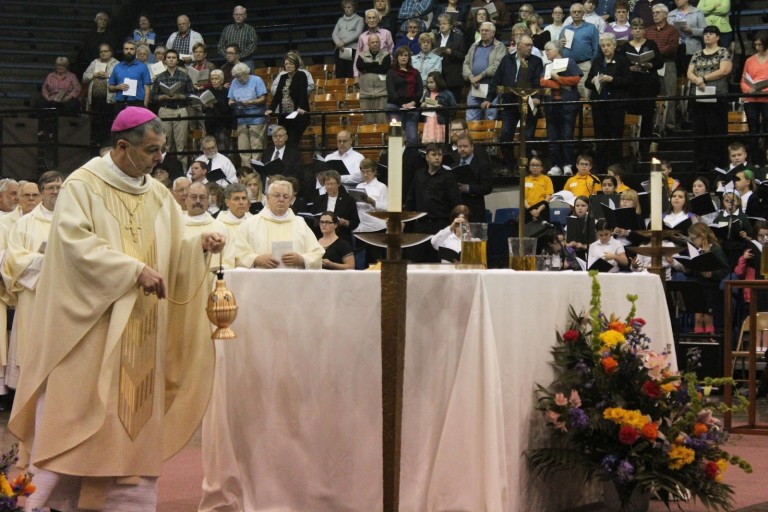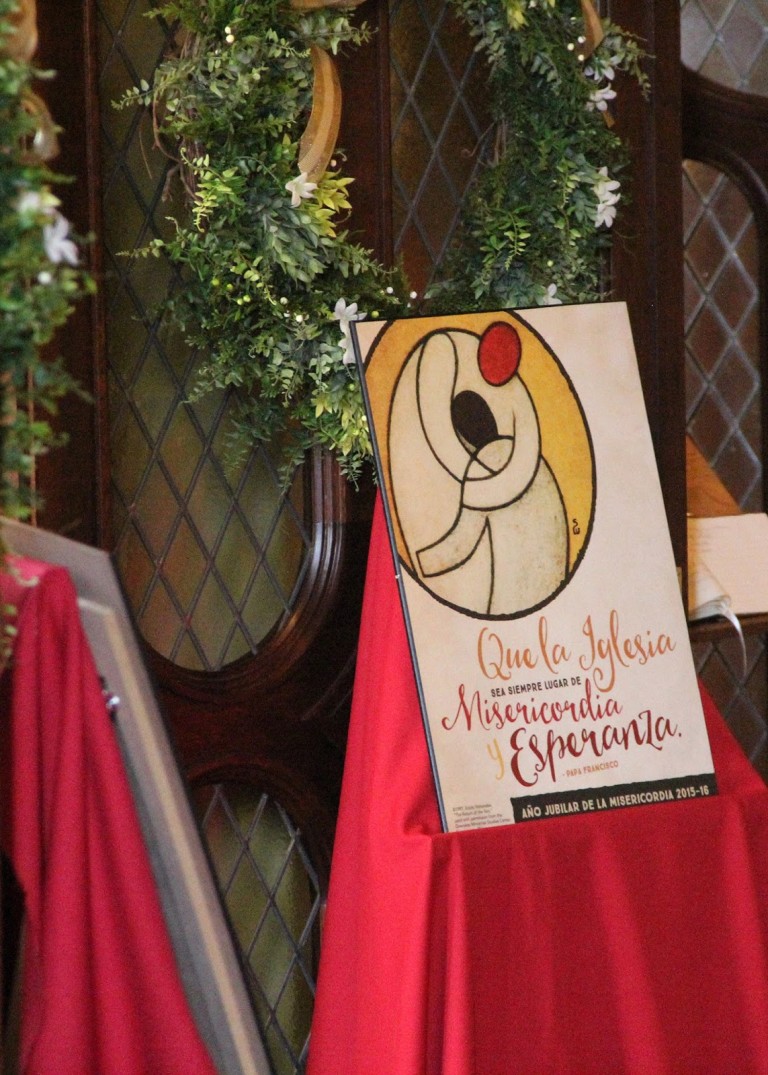This column originally ran in the March 2016 issue of The Western Kentucky Catholic under ‘A Word from Bishop Medley.’

I am often asked the question, “Why do you remain a Roman Catholic?” You may pause to think that someone would ask this question of a bishop. But the context is usually that the questioner is often disillusioned by the Catholic Church as they know it in our day, or perhaps even across its history. After all, the failures and shortcomings of the followers of Christ are epic. That failure did not take long; even the lives of the Apostles are marked by human sin. The imperfections of the Church still are documented and displayed in 2016.
In the interest of some balance, allow me to note too that the Catholic Church, from the Apostles onward, is rich in accomplishments and heroic witness. The lives of saints portray some of the greatest charity and nobility of human history.
But my answer; why do I remain? I answer now as I would have fifty years ago. I am Catholic because I believe that Jesus abides with this flawed Church through the sacrament of the Holy Eucharist.
“For I received from the Lord what I also handed on from you, that the Lord Jesus, on the night before he was handed over, took bread and, after he had given thanks, broke it and said, ‘This is my body that is for you, do this in remembrance of me.’ In the same way also the cup, after supper saying, ‘This cup is the new covenant in my blood. Do this, as often as you drink it, in remembrance of me.’ For as long as you eat this bread and drink the cup, you proclaim the death of the Lord until he comes.” (I Corinthians 11: 23-26)
The Church speaks of the Holy Eucharist as the “real presence” of Christ continuing in the world. Yes, Christ’s presence is manifest in many ways: in the other sacraments, in the proclamation of the Word of God, and very notably in the assembly of the faithful who gather to share in this remembrance. The Eucharist though, I would say, is a premier presence of Christ. It is that ritual action that Jesus himself defined and entrusted so powerfully to the Apostles and to the Church at the Last Supper. Historically we know that the Church as a community and institution has evolved and had many faces over twenty centuries. But Paul’s words to the Corinthians document that Church from its earliest days found this ritual, this sacrament, constitutive of what it means to follow Christ.
The Fathers of the Second Vatican Council, in reflecting on the Holy Eucharist, speak in Lumen Gentium of the sacrament as the “source and summit of Christian life.” By this they teach us that the sacrament of Holy Communion is the source to which we come to enrich the very life of Christ within us. Likewise it is the summit where we celebrate and extol our shared life in Christ.
Often I look out upon the assembly at Mass and realize that these few dozen or maybe many thousands of people come with very diverse motives. On any given Sunday there may well be someone who just days before has learned of a serious illness of a loved one or themselves. Some are in deep depression, concerned over a failing marriage or children headed in a wrong direction. But others are there carrying a secret that they know new life has been conceived and is growing within them. Perhaps a dream has been fulfilled or a milestone accomplished.
For all of these the Holy Eucharist is an apt place to come to worship, to celebrate, to find consolation and hope. The church wisely seeks to observe life’s profound moments near the table of the Eucharist, celebrating Baptism, Matrimony and Christian funerals there.
Whatever extreme of human emotion one brings to the Lord’s table, it is always a place of mercy. Every time we approach the table the last public words we speak are a plea for mercy: “Lord I am not worthy that you should enter under my roof, but only say the word and my soul shall be healed.” I believe that our Lord does not hesitate for one moment to speak that word. As Pope Francis has so aptly reminded us, the name of God is mercy. We are not perfect as we approach the altar and most likely will not be perfect for long when we leave. But in this moment of grace Jesus Christ heals our souls. Holy Communion is not a reward for saints but a medicine for sinners. I have often remarked that if only saints could come to Holy Communion that we could save a lot of money on bread and wine.
Holy Thursday is March 24. On this sacred night we celebrate the Mass of the Lord’s Supper. We remember the institution of the sacrament of the Holy Eucharist. As a prelude to eating and drinking the bread and wine that has become the Body and Blood of Christ, the Church celebrates a once a year ritual. The priest(s) call forth from the assembly of the faithful men and women to symbolically have their feet washed, recalling Jesus’ own action at the Last Supper. “As I have done, so must you do.” So, there is a cost to the sacrament: we must commit over and over again to serving our neighbor, especially the least among us.
Check your Church bulletin and plan now to celebrate this Commemoration of the Lord’s Supper in your parish.
I guess I could write a book, or several books, about why I am a Catholic and love this flawed Church. But the heart of my answer would always be that I am fed and nurtured by her, just as Jesus intended.
Most Reverend William F. Medley
Diocese of Owensboro
La Santa Eucaristía: Fuente y Culmen de la Vida Cristiana
Mi querido pueblo de Dios,

Con el fin de ofrecer un poco de balance, permítame mencionar también que la Iglesia Católica, desde los Apóstoles en adelante, está rica en logros y testimonio heroico. Las vidas de los santos son ejemplos de la caridad y nobleza más grande de la historia humana.
Pero mi respuesta de ¿por qué me quedo? Contesto ahora igual que lo hubiera hecho hace cincuenta años. Yo Católico porque creo que Jesús vive en esta Iglesia imperfecta en el sacramento de la Santa Eucaristía.
“Lo que yo recibí del Señor, y a mi vez les he transmitido, es lo siguiente: El Señor Jesús, la noche en que fue entregado, tomó el pan, dio gracias, lo partió y dijo: «Esto es mi Cuerpo, que se entrega por ustedes. Hagan esto en memoria mía». De la misma manera, después de cenar, tomó la copa, diciendo: «Esta copa es la Nueva Alianza que se sella con mi Sangre. Siempre que la beban, háganlo en memora mía». Y así, siempre que coman este pan y beban esta copa, proclamarán la muerte del Señor hasta que él vuelva.” (1 Corintios 11:23-26)
La Iglesia habla de la Santa Eucaristía como la “presencia real” de Cristo continuando en el mundo. Sí, se manifiesta la presencia de Cristo en muchas formas: en los demás sacramentos, en la proclamación de la Palabra de Dios, y particularmente en la asamblea de los fieles quienes se juntan para compartir en esta memoria. Pero yo diría sin embargo que la eucaristía es la presencia principal de Cristo. Es la acción ritual que Jesús mismo definió y entregó tan poderosamente a los Apóstoles de la Iglesia en la Última Cena. Pero las palabras de Pablo a los Corintios documentan que la Iglesia desde sus primeros días encontró en este rito, este sacramento, lo primordial de lo que significa seguir a Cristo.
Los Padres del Consejo Vaticano Segundo, reflexionando sobre la Santa Eucaristía, en Lumen Gentium dicen que el sacramento es “la fuente y culmen de la vida Cristiana.” Con esto nos enseñan que el sacramento de la Sagrada Comunión es la fuente donde acudimos para enriquecer la vida de Cristo mismo en nosotros. Asimismo es el culmen donde celebramos y ensalzamos nuestra vida compartida en Cristo.
Con frecuencia contemplo la asamblea en la Misa y me doy cuenta de que estas docenas o hasta miles de personas vienen con motivos muy diversos. En cualquier Domingo puede haber alguien que días antes se enteró de una enfermedad grave de un ser querido o de sí mismo. Algunos están en una depresión profunda, preocupados por un matrimonio en fracaso o hijos en un mal camino. Pero otros allí están guardando el secreto de una vida nueva que ha sido concebido y está creciendo en sus vientres. Tal vez otros alcanzaron una meta o cumplieron un sueño. Para todos la Santa Eucaristía es un lugar apto para venir a dar culto, celebrar, y encontrar consuelo y esperanza. La Iglesia con mucha sabiduría procura observar los momentos profundos de la vida cerca a la mesa de la Eucaristía, celebrando el Bautizo, el Matrimonio y funerales cristianos allí.
Sin importar cual extremo de las emociones humanos nos acerca a la mesa del Señor, siempre es un lugar de la misericordia. Cada vez que nos acercamos a la mesa las últimas palabras que decimos en voz alta son pedir la misericordia: “Señor, no soy digno de que entres en mi casa, pero una palabra tuya bastará para sanarme.” Creo que nuestro Señor no se espera ni un momento para decir esta palabra. Como el Papa Francisco nos ha recordado tan bien, el nombre de Dios es la misericordia. No somos perfectos al acercarnos al altar y seguramente no seremos perfectos por mucho tiempo después, pero en este momento de gracia Jesucristo nos sana nuestras almas. La Sagrada Comunión no es recompensa para los santos sino una medicina para los pecadores. Con frecuencia he dicho que si solamente los santos podrían venir a la Sagrada Comunión podríamos ahorrar mucho dinero en el pan y vino.
El Jueves Santo es el 24 de Marzo. En esa noche sagrada celebramos la Misa de la Cena del Señor. Recordamos la institución del sacramento de la Santa Eucaristía. Como preludio de comer y beber el pan y el vino que se ha convertido en el Cuerpo y la Sangre de Cristo, la Iglesia celebra un rito que se hace una sola vez al año. El sacerdote llama de la asamblea de los fieles hombres y mujeres para lavarse los pies simbólicamente, recordando la acción de Jesús en la Última Cena. “Lo que yo he hecho con ustedes, también ustedes lo hagan.” Entonces, hay un costo del sacramento, tenemos que comprometernos una y otra vez a servir nuestro próximo, especialmente el más necesitado entre nosotros.
Observe el boletín en su parroquia y haga planes ahora para celebrar esta Conmemoración de la Cena del Señor en su parroquia.
Supongo que podría escribir un libro, o varios libros, sobre el por qué soy Católico y amo a esta Iglesia imperfecta. Pero en el centro de mi respuesta siempre será que soy alimentado y nutrido por ella, igual como propuso Jesús.
Obispo William F. Medley
Diócesis de Owensboro
